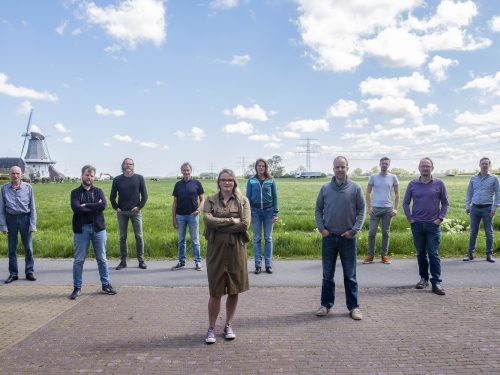Multi-use biodegradable cup
development of sustainable drinking cups for festivals
This European project deals with two important current topics: the (re) use of bioplastic for drinking cups and stimulating reuse of drinking cups at festivals.
Partners
Together with NHL / Stenden University, Limm recycling, Worldperfect (Denmark), Innofest and Van Hall Larenstein University of Applied Sciences, we are working on the development of sustainable drinking cups. The aim is to introduce bioplastic for drinking cups and stimulate the use and reuse of these drinking cups at festivals.
Material research
The material we want to use is polyhydroxyalkanoates (PHA), a bioplastic that is suitable for cold and hot drinks. At the moment, according to the requirements of the Food and Consumer Product Safety Authority (NVWA), it is not permitted to reuse PHA for food products, which is why the material is currently ‘downcycled’ to another product. The PHA is made from local biomass, extracted from wastewater from Friesland.
Behaviour change
In the Netherlands, drinking cups are often used only once and then thrown away. This happens on a large scale at festivals, but also at schools and at many offices. We would like to brake this habit and that is why we are working on an innovative and suitable design in the coming months that is suitable for reuse on festivals and in gouvernment buildings.
BIOCAS100%
The development of ‘biobased’ drinking cups is part of an Interreg NSR (North Sea Region) project BIOCAS100% (BIOmassage CAScading to 100%) in which the province of Friesland is lead partner. The project aims to generate economic, social and ecological progress in rural areas through the optimal use of biomass raw materials.
The rural areas in the North Sea region play an important role in the development of a regional circular bio-economy. Encouraging this development and transforming the rural areas into smart specialized regions is the goal of the BIOCAS project. In these areas, the local use of biomass has been integrated on the basis of cascading principles. This means that you first extract the valuable substances from the biomass before you process it.
Subproject sustainable drinking cup
The Province of Friesland cooperates in BIOCAS100% with partners from the Netherlands, Denmark, Germany and Belgium, including many knowledge institutions that are engaged in research into bioplastic.
NHL / Stenden University has asked House of Design to develop and manage the subproject around the ‘bio-based’ drinking cup. This is due to the knowledge and experience of Eileen Blackmore, and her extensive network around the theme of sustainability.
ACTIVITIES
- preliminary investigation into the situation at festivals
- life cycle analysis (LCA) bioplastic cups
- design driven innovation’; design sessions with students and partners of the value chain
- testing at festival Here comes the summer 2018 in collaboration with Innofest
- developing a manual for a sustainable value chain
- final symposium in Aarhus 2019
IN SHORT
Where: Friesland, Denmark, Germany
When: July 2017 – November 2021
Partners: NHL / Stenden University of Applied Sciences, Limm recycling, Worldperfect (DK), Innofest and Van Hall Larenstein
Tags: innovation, local, reuse, bioplastic, biobased economy, circular economy
Financed: InterregNSR
You can download the Biocas_quick guide in which the value chain is described.
NHL Stenden created a short documentary showing the different roles of the stakeholders involved in the devoloping of the Biocup.
The BioCup is now produced by Limm Recycling under the name Happy Cups: www.happycups.nl





